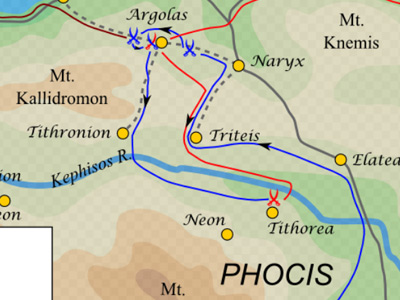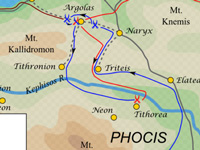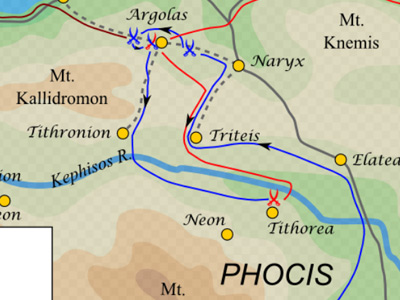Third Sacred War (356–346 BC)

Settlement of the Sacred War
Preliminaries
Athens and Macedon had been at war since 356 BC, after Philip's capture of the Athenian colonies of Pydna and Potidea. Philip had then been drawn into the Sacred War, on behalf of the Thessalians. Since Athens was also a combatant in the Sacred War, the war between Athens and Macedon was inextricably linked with the progress of the Sacred War. In 352 BC, Philip's erstwhile ally, the Chalkidian League (led by Olynthos), alarmed by Philip's growing power, sought to ally themselves with Athens, in clear breach of their alliance with Philip. In response, Philip attacked Chalkidiki in 349 BC, and by 348 BC, had completely destroyed the Chalkidian League, razing Olynthos in the process. The prominent Athenian politician Philocrates had suggested offering Philip peace in 348 BC, during the Olynthian war. The war between Athens and Philip thus continued through 347 BC, as did the Sacred War.
In early 346 BC, Philip let it be known that he intended to march south with the Thessalians, though not where or why. The Phocians thus made plans to defend Thermopylae, and requested assistance from the Spartans and the Athenians, probably around 14 February. The Spartans dispatched Archidamus III with 1,000 hoplites, and the Athenians ordered everyone eligible for military service under the age of 40 to be sent to the Phocians' aid. However, between the Phocians' appeal and the end of the month, all plans were upset by the return of Phalaikos to power in Phocis; the Athenians and the Spartans were subsequently told that they would not be permitted to defend Thermopylae. It is not clear from the ancient sources why Phalaikos was returned to power, nor why he adopted this dramatic change of policy. Cawkwell suggests, based on remarks of Aeschines, that the Phocian army restored Phalaikos because they had not been properly paid, and further that Phalaikos, realizing that the army could not be paid and that the Phocians could no longer hope to win the war, decided to try to negotiate a peace settlement with Philip.
Peace between Macedon and Athens
When the Athenians received this news, they rapidly changed policy. If Thermopylae could no longer be defended, then Athenian security could no longer be guaranteed. By the end of February, the Athenians had dispatched an embassy, including Philocrates, Demosthenes and Aeschines, to Philip to discuss peace between Athens and Macedon. The embassy had two audiences with Philip, in which each side presented their proposals for the terms of the peace settlement. The embassy then returned to Athens to present the proposed terms to the Athenian Assembly, along with a Macedonian embassy to Athens, empowered by Philip to finalize an agreement. On 23 April, the Athenians swore to the terms of the treaty in the presence of the Macedonian ambassadors.
Embassies to Philip
After agreeing to the peace terms with Macedonian ambassadors in April, the Athenians dispatched a second embassy to Macedon, to extract the peace oaths from Philip; this embassy travelled to Pella at a relaxed pace, knowing that Philip was away on campaign against the Thracian king Kersebleptes. When they arrived, the Athenians (again including Demosthenes and Aeschines) were rather surprised to find embassies from all the principle combatants in the Sacred War were also present, in order to discuss a settlement to the war.
When Philip returned from Thrace he received both the Athenian and other embassies. The Thebans and Thessalians requested that he take the leadership of Greece, and punish Phocis; conversely, the Phocians, supported by the Spartans and the Athenian delegations, pleaded with Philip not to attack Phocis. Philip, however, delayed making any decisions; "[he] sought by every means not to reveal how he intended to settle things; both sides were privately encouraged to hope that he would do as they wanted, but both were bidden not to prepare for war; a peacefully arranged concordat was at hand"; he also delayed taking the oaths to the Peace of Philocrates. Military preparations were ongoing in Pella during this period, but Philip told the ambassadors that they were for a campaign against Halus, a small Thessalian city which held out against him. He departed for Halus before making any pronouncements, compelling the Athenian embassy to travel with him; only when they reached Pherae did Philip finally take the oaths, enabling the Athenian ambassadors to return home.
Occupation of Thermopylae
It was in the aftermath of finally ratifying the Peace that Philip applied the coup de grace. He had persuaded the Athenians and other Greeks that he and his army was heading for Halus, but it seems certain that he also sent other units straight to Thermopylae. Thus, when he swore oaths to the Athenian assembly in Pherae, his troops were already very close to Thermopylae; by the time the Athenian ambassadors arrived home (9 July), Philip was already in possession of the pass. By delaying the oaths, and making what was effectively a feint against Halus, he prevented the Athenians from seeing their imminent danger, and from having time to garrison the Thermopylae.
Peace settlement
All of central and southern Greece was now at Philip's mercy, and the Athenians could not now save Phocis even if they abandoned the peace. However, the Athenians were still ignorant of this turn of events when Phocian ambassadors came to Athens to plead for military aid around 9 July. The Athenian council recommended that the peace be rejected, and Thermopylae be occupied in order to help save Phocis; since, as far at the Athenian embassy knew, Philip's troops were still in Pherae, there seemed to be ample time to occupy the pass. By 12 July the news that Philip was "in the gates" arrived in Athens; the Athenians then knew that the situation was hopeless, and instead of acting on the previous recommendation of the council, the Assembly instead passed a motion re-affirming the Peace of Philocrates.
Now that he was in control of Thermopylae, Philip could be certain of dictating the terms of the end of the Sacred War, since he could now use force against any state that did not accept his arbitration. He began by making a truce with Phalaikos on 19 July; Phalaikos surrendered Phocis to him, in return for being allowed him to leave, with his mercenaries, and go wherever he wished. Cawkwell suggests that Phalaikos probably collaborated with Philip in 346 BC, allowing Philip to take Thermopylae in return for lenience for him and his men. Otherwise, it is difficult to see how Philip could have advertised his campaign so far in advance (and been so confident of success), and yet not been stopped at Thermopylae. Philip restored to Boeotia the cities that Phocis had captured during the war (Orchomenos, Coroneia and Corsiae), and then declared that the fate of Phocis would not be decided by him, but by the Amphictyonic Council. This caused great panic in Athens, since the Phocians could never hope for mercy from the Amphictyons, and since Athens was also (having allied with Phocis) shared in the same sacrilege. However, it is clear that Philip was dictating the terms behind the scenes; allowing the Amphictyons the formal responsibility allowed him to dissociate himself from the terms in the future.
In return for ending the war, Macedon was made a member of the Amphictyonic council, and given the two votes which had been stripped from Phocis. This was an important moment for Philip, since membership of the Ampictyony meant that Macedon was now no longer a 'barbarian' state in Greek eyes. The terms imposed on Phocis were harsh, but realistically Philip had no choice but to impose such sanctions; he needed the support of the Thessalians (sworn enemies of Phocis), and could not risk losing the prestige that he had won for his pious conduct during the war. However, they were not as harsh as some of the Amphictyonic members had suggested; the Oeteans had demanded that the traditional punishment for temple robbers of being pushed over a cliff be carried out. Aside from being expelled from the Amphictyonic council, all the Phocian cities were to be destroyed, and the Phocians settled in 'villages' of no more than fifty houses; the money stolen from the temple was to be paid back at a rate of 60 talents per year; He did not, however, destroy the Phocians, and they retained their land. The Athenians, having made peace with Philip, were not penalised by the Amphictyonic council, and the Spartans also seem to have escaped lightly. Philip presided over the Amphictyonic festival in the autumn, and then much to the surprise of the Greeks, he went back to Macedon and did not return to Greece for seven years. He did however retain his access, by garrisoning Nicaea, the closest town to Thermopylae, with Thessalian troops.
Aftermath
The destruction of the Phocian cities and the heavy fine imposed on the Phocian confederation certainly caused the Phocians to bear a grudge against Philip II. Seven years later the Locrians brought charges against the Athenians in the amphictyonic council and a special session of the council was set in order to deal with that matter. The Athenians, however, did not send envoys and neither did the Thebans. This was a clear insult to the council and Philip II intervened once more as a regulator. The Fourth Sacred War broke out, ending in the total subjugation of Greece to the kingdom of Macedonia. The Phocians recovered gradually from the repercussions of the Third Sacred War and managed to be reinstated in the Amphictyony in 279 BC, when they joined forces with the Aetolian League fighting against the Gauls. However, a serious side-loss of the Third Sacred War remained the destruction of a large number of ex votos and other precious offerings to the sanctuary of Apollo, which deprived not only the sanctuary itself but also the later generations of some magnificent pieces of art.
HISTORY

RESOURCES
This article uses material from the Wikipedia article "Third Sacred War (356–346 BC)", which is released under the Creative Commons Attribution-Share-Alike License 3.0.
© Stories Preschool. All Rights Reserved.









